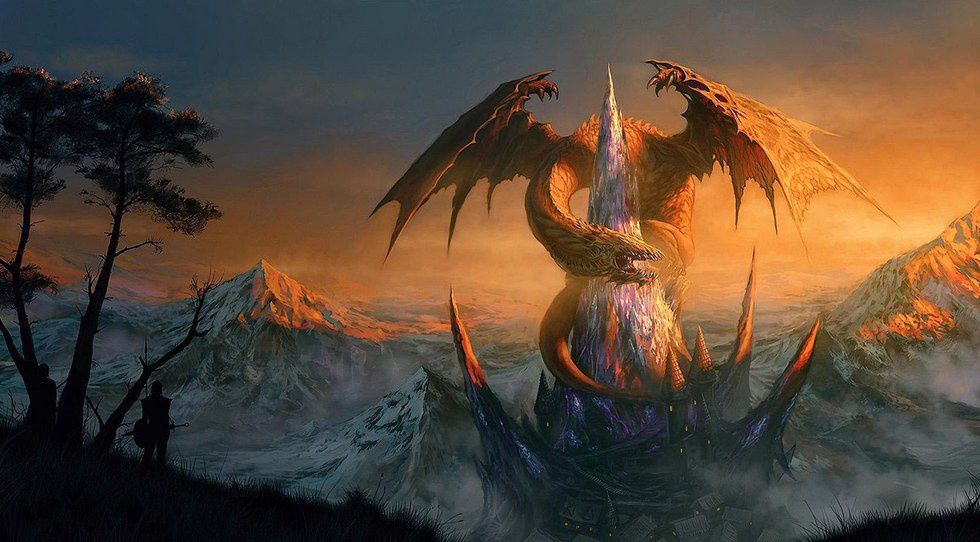Perhaps one of the most underrated parts of storytelling is the world in which the story resides. Every work of fiction has its own world, be it video games such as Skyrim where dragons reign supreme and the world is filled with magic and sword fighting or movies like Captain America where New York is a breeding ground of superheroes and alien attacks. The world is such an important factor in storytelling because it dictates what can and cannot be done. It sets the premise of the entire story, creating the woes a character faces, or presenting the chance of a lifetime, or even shattering the foundation beneath the character’s very feet. The world defines it all and because of this, I have compiled a list of 5 questions to better help you create that wonderful world for your characters.
1. Does the world have a religion? If so, What does it revolve around and what are its practices?
not) religion plays such a huge factor in life. Millions of people base their entire lives around their religion and it will dictate how they perceive the world, how they interact with other character, and how they make decisions. So, as a storyteller, you need to consider what type of religion (if any) exists in your world. Do the people worship a Deity or nature? Are there conflicting religions? If so what religion is more dominant in the region where your story takes place? Is the protagonist religious? All of these questions will help you understand what factors are at play in your story’s world and even help create tension.
2. Is the world based off of any preexisting society?
This question plays a huge factor if your story takes place in a specific historical era (Ancient Rome, Victorian England, etc) because if the world is based off of any of these societies, then you must adhere to the rules of said society. Nothing is more frustrating than reading a story you know is wrong. It is easy to create your own rules in a story and to have a solution for everything that could possibly happen, but the real challenge lies in morphing a character within a society’s laws. Instead of being able to do whatever you wish, now you must think about each action your character takes. Will stealing that mystical jewel land them in jail or will it lead to their hand getting cut off? What about their clothing? How did people dress in that time period? How did they act? What language was most prominent during this time? All these barrier add to your world, making it real and believable. Now, I’m not saying if you chose an Ancient Greece setting, you cannot stray beyond what is already known about the culture— storytelling would not be the same without a little embellishing here and there— I’m saying that certain aspects must have a continuity and logical flow. Unless it’s Steam Punk. That genre just breaks all the rules.
3. What are the laws governing your world?
As we are bound by laws of society, so is your character. In your world what are the major governing powers? Is there a king or queen? How about an emperor or a council? Who makes the decisions in the world? How are they made? What is considered a crime? How do they punish those who break the law? Law and order is a part of every society spanning back millions of years and plays a key role in what your character is “allowed” to do or not to do (not that they may necessarily obey said rules). Rules create tensions between the world and your character. They set the barriers in which your character will overcome and be the backbone of every decision made. You must decided if your world will be an All for One or One for All type of society and exactly how your character feels about that? Will they be a rebel in the making with dirt smeared on their cheeks and their knees scuffed from the amount of times they got knocked down? Will they be dressed in uniform; putting their life on the line every day just to uphold the law they know in their heart to be just? Will they tear down society or rebuild it?
4.Any unnatural aspects of the world?
Basically are there dragons, because let’s be honest, daily life changes quite a bit if going outside your home means facing a possible fiery death just to grab a bite to eat. All jokes aside, fantastical elements are a key decision for any storyteller. Will your world be one of magic and adventure or one of reality and the mysteries theworld presents us? If your world does have magic, is it common knowledge or is it a hidden secret? Are magical creatures rare? Is your world at war with magic or is it a valued ally? This is usually a decision you want to make early on in the creation of your world because it will most often set the premise of your plot.
5. What sort of people are in this world?
This is probably the most important question you need to consider when creating a world. People craft the world they live in. They shape its societies and laws. They set barriers for your character to overcome or provide aide when your character is down and doesn’t know how to carry on. People are so important to a story and they deserve to be considered when you are creating their world. Think about the people in our own world. What types of races are there? How does each of these groups of people interact with each other? Do they get along? What are their beliefs and culture? What makes them unique? How does your character stand in contrast to them? How are they similar? Why are they in your story? How do their rules help or hinder your character? What are their views on sex? Marriage? Are they a war-based society or a peace keeping one? Is the world overrun by greed and solidarity or companionship and tolerance? All of these things will better help you understand now only the world you’ve created, but also your hero.
People are often so absorbed in the plot of a story that they often forget the world that exists on the page as well. The world sets the atmosphere of the story. It allows the reader to fall into the book and witness the story first hand through your character. They will be frustrated at the rules and limitations imposed on them and rejoice when they manage to overcome the obstacles.
And even when the story is done, the last page having been read over and over again, they can always go back into your world and re-experience it again and again.
The world is the lasting image you leave in your readers; don't just skimp by on it to get to the plot.


























